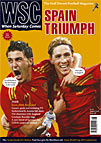 In Spain Phil Ball saw a traditionally divided country come together at last, in football terms at least
In Spain Phil Ball saw a traditionally divided country come together at last, in football terms at least
The world turned upside down – Spain the favourites to beat Germany in the final. Despite all evidence to the contrary, the ever-superstitious and pessimistic population, represented by its ever-pessimistic and superstitious popular press, were convinced that the Germans would still win. It was nonsense, but Spain needed a get-out clause. It is written into the constitution.
You could see the truth at the end in the German players’ faces, as Spain celebrated their first tournament win for 44 years. There was no weeping and wailing, reactions that normally signal a close game or emotions that proclaim the tears of a team unjustly defeated. The Germans knew they had lost to a better side.
Spain, for all their emotional clutter and neuroses, turned up at the tournament with a clear idea at least. Pass the ball from the back to your midfielders. They control it, look around, and pass it short to one of their team-mates. They in turn look for the forwards who are making runs into space. Hardly complicated, but Spain had five midfielders who could control the ball. It made a lot of difference.
Luis Aragonés, an ageing but eternal optimist (despite the suicidal expressions), knew two things before this tournament. He knew that if he could find the right central midfielder to protect the back line, his defenders would play decently enough. So he picked Marcos Senna to play behind Xavi, Andrés Iniesta and David Silva, with the occasional entrance of Cesc Fábregas to mix things along nicely. It worked like a dream because Senna is a natural successor to Claude Makelele, and made Carlos Marchena and Carles Puyol look like great centre-backs, which they are not – just as Makelele made John Terry look better than he really is. Senna, a naturalised 32-year-old Brazilian who plays for unfashionable Villarreal, was the player of the tournament.
The second thing Aragonés knew was that for the squad to function, it would be a good idea to ensure that they got on with each other. Which was why he decided to omit Raúl from the squad. It had nothing to do with footballing ability. There had been talk about the Catalan “faction” in the group, or the Basque one (aka Xabi Alonso) – as if this automatically meant that there was tension again in the camp. But Puyol is too busy listening to the Ramones to worry about reading secessionist literature, Xavi doesn’t care, and Fábregas is just a kid who lives in London.
The only extremist around was Raúl himself, a Spanish nationalist with a quietly aggressive manner that could intimidate young players and also anyone not committed to the “cause”, like Fernando Hierro before him, who on several occasions expressed nostalgia for the good old days – Spain was Spain and the commies stayed under the beds.
Raúl’s contribution to the cause cannot be overlooked, but he fell out with Aragonés at the 2006 World Cup in an incident that seriously weakened the coach’s authority in Germany. Aragonés waited for his revenge and, despite the enormous pressure and the constant criticism from the Madrid-led faction of the Spanish press, he never caved in. Raúl stayed at home, was never sought-out for his opinion on the progress of the team, and the “R” word disappeared from the media discourse, vanishing like the reputations of the anti-Aragonés faction.
Of course, wonderful though Spain were, the cultural divide was still ever-present. Sergio Ramos’s flaunting of the Andalucian flag during the celebrations was picked up by the blogs and condemned by the Catalans in particular, who protested that if Xavi had done the same with their flag, it would have started a civil war. Similarly, Alonso, who was handed the Spanish flag temporarily by Santo Cazorla, managed to pass on the hot potato as quickly as possible, almost out of camera shot. These things can be life-and-death situations in Spain. It’s no joking matter.
The idea that the win can unify Spain has been somewhat overplayed, but it can certainly help to bury some of the old ghosts. The sight of Catalans, a Basque and a Brazilian all bouncing up and down in unbridled pleasure as the Spanish flag flew behind them is the kind of thing that just might signal a better future – one less dysfunctional and factionalised. If that can happen as a by-product of this happy but unexpected triumph, then fine, I say.
Spain’s win was about technique and imagination – two nouns that the English, for all their boasting about their over-hyped Premier League, are still unable to spell. If Spain’s win can help to influence the style of the immediate future, then the idea of passing and controlling the ball might just get as far as Soho Square. But that would be turning the world upside down then shaking it.
From WSC 258 August 2008